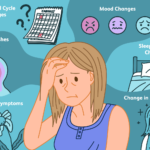
It’s Sunday September 5th, 2021, and this evening we discuss a very sensitive and challenging problem for many couples; the issue of infertility; not being able to conceive a child after a year of trying…
For some couples the evaluation, diagnosis and treatment can be relatively simple and straightforward with early success but for others it can be a traumatic, emotional roller coaster…
If you or someone you know has been on this journey there is one syndrome that you will hear mentioned more often than others as a leading cause of female infertility…and that is Polycystic Ovary syndrome…PCOS.
First described in 1935 by two American Gynaecologists, Irving Stein and Michael Leventhal- it was known as the Stein-Leventhal Syndrome…and for many years the original criteria set by their case reports were used to make the diagnosis…but with more research and data availability, the current criteria used by most healthcare providers was established in 2003- it is called the Rotterdam criteria arising out of a collaboration of the European Society for Human Reproduction and Embryology and the American Society for Reproductive Medicine … it requires two out of three of the following to be present…
- A disturbance in ovulation-either complete absence or reduced frequency of releasing an egg from the ovaries
- Evidence of excess male hormone levels- what is called hyperandrogenism- and this can be either on blood tests to check the levels OR in clinical features such as acne and hirsutism. The latter is when there is excess hair growth, usually thick dark hair, on the face, chest, abdomen, arms, and legs. Additionally, there may be dry, velvety, dark patches of skin called acanthosis nigricans along the neckline, the armpits and the skin folds of your forearm and groin.
- A pelvic ultrasound showing the presence of at least 12 follicles on one or both ovaries or an increased ovarian volume greater than 10cc.
Note that the ultrasound findings are not an absolute requirement to diagnosing the condition and there are women with PCOS who do not have ultrasound findings
and the reverse is also true…there are women with ultrasound findings who do not have any of the other criteria required to diagnose PCOS.
Additionally, PCOS is associated with an increased risk of diabetes with insulin resistance and elevated fasting insulin being noted in many patients.
There is also an increased risk of developing high blood pressure, abnormal lipid profiles, cardiovascular disease, and endometrial carcinoma.
So, what does the gut microbiome have to do with PCOS…well it’s been over 85 years since Stein and Leventhal reported on their cases and yet we are still at a point where we treat the symptoms, but the underlying cause remains elusive. For example, women who have ovulation issues and are desirous of conceiving, ovulation inducers are prescribed; those with severe acne and hirsutism receive anti-androgen therapies, those with insulin resistance may be prescribed an insulin sensitiser like metformin and those desirous of having regular predictable periods but not conception may be put on an oral contraceptive… There will be emphasis placed on having regular physical exercise such as a daily 30-minute walk and a diet that significantly reduces sugar, starch, and saturated fat.
In 2017, researchers from the university of Graz in Austria analysed the gut microbiome of PCOS patients using stool samples and compared it with samples taken from healthy women. There were two notable findings: Compared to healthy women, the PCOS patients had a much-reduced diversity in their stool bacterial population and significantly less of certain strains.
This was the first documented study of the gut microbiome composition from stool samples of human PCOS subjects.
Then a larger study came along in 2018 … conducted by researchers from Poznan University in Poland and University of California, San Diego and corroborated the finding of the 2017 study -showing that patients with PCOS lacked the richness of species carried by healthy women. Furthermore, the blood levels of male hormones and the presence of hirsutism was inversely related to the degree of diversity…women with the lowest variation in gut bacteria had the most hyperandrogenism.
But here comes the most compelling evidence to date, that there is a relationship between gut health and PCOS.
In 2019, Qi et al, from the Peking University in Beijing China, analysed stool samples from PCOS patients and found a predominance of a particular bacteria, Bacteroides vulgatus. These bacteria are known to break down bile acids in the stool, so it was not surprising to find that the samples with high amounts of Bacteroides also had low amounts of bile acids. They subsequently transplanted the stool samples into mice and quite remarkably they found that the female mice demonstrated evidence of excess male hormones, ovarian dysfunction, insulin resistance, an impairment of reproductive cycles with less offspring and a reduction in bile acids in the stool.
Additionally, when the mice were given only isolated Bacteroides and not the entire stool sample, they developed the same features. This led the researchers to look at ways in which the immune system of patients with PCOS could be affected by bile acids.
Sure enough, on further analysis, it was found that bile acids are involved in the regulation of an immune system chemical known as interleukin 22.
So then the magic question is …if the mice that developed PCOS after being colonised with high levels of Bacteroides in their gut that resulted in low levels of bile acids and hence low levels of interleukin 22- will administering interleukin 22 to the mice reverse their symptoms?
Indeed it did! The authors treated PCOS-like mouse models with IL-22, and they showed a full recovery of reproductive cycles and ovarian appearance and reduced insulin resistance and testosterone levels.
If all this scientific description has your head spinning, let me close with some very simple take home messages: if you or someone you know is dealing with Polycystic ovaries, ensuring a high fiber intake from diverse sources of vegetables and fruits will only enhance their overall plan and integrates very well with the already prescribed diet low in sugar , starch and saturated fat…so don’t miss out on the incredible benefits of having the most stealthy and healthy gut while the research continues…
It was indeed a pleasure to have the opportunity to share this emerging science with you, hot off the press and I hope you will make good use of it as we all continue on our journey to becoming HEROES OF OUR OWN HEALTH…




